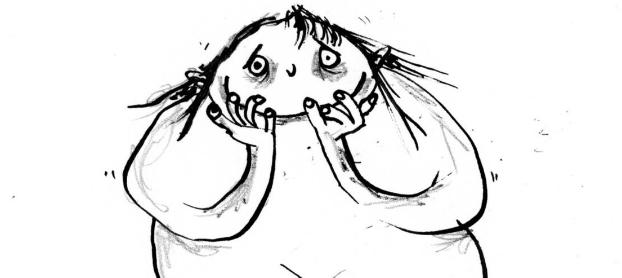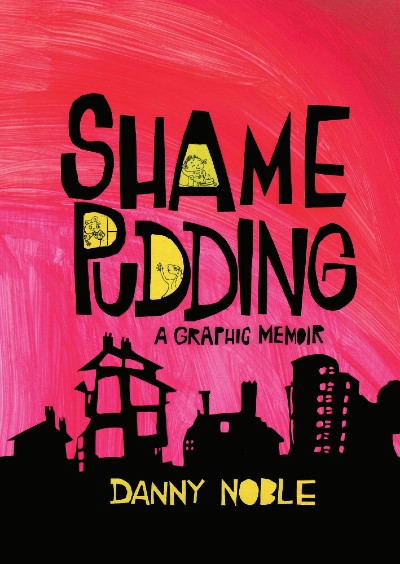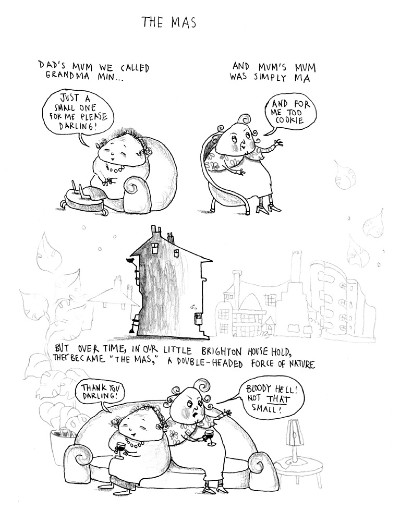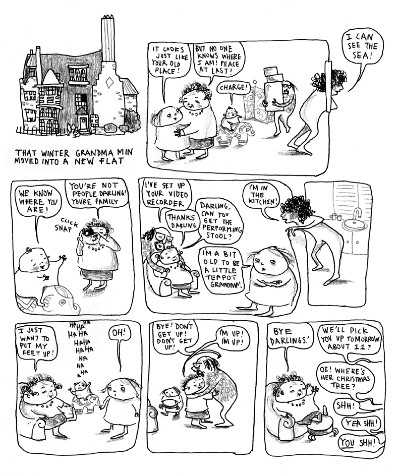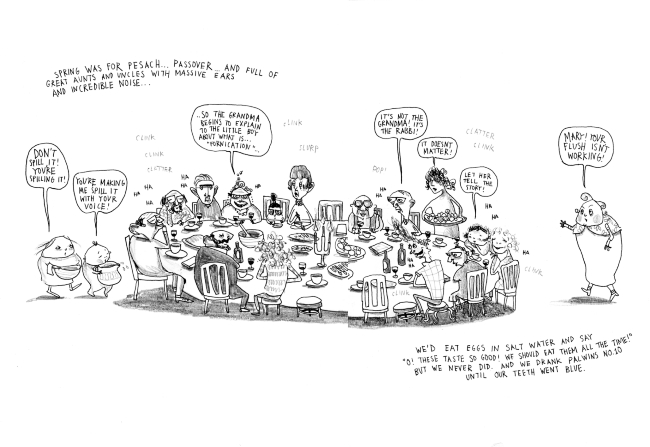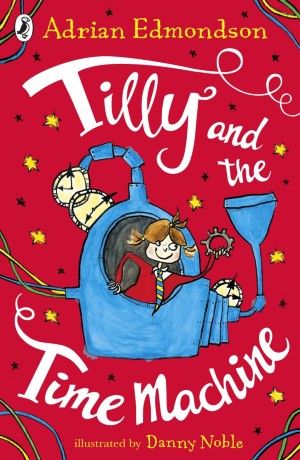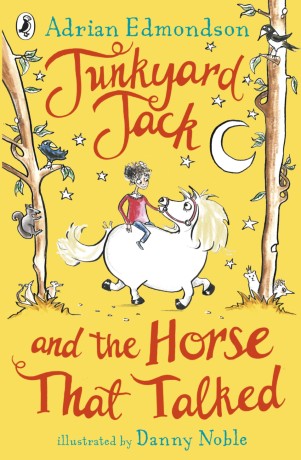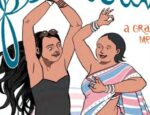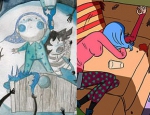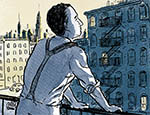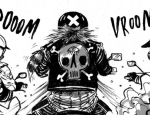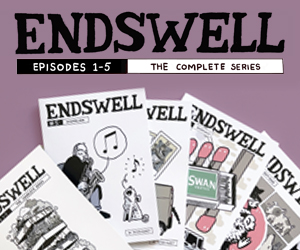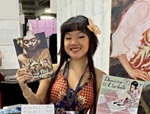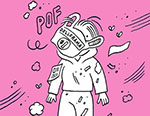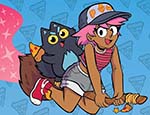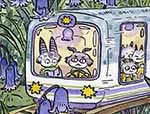Danny Noble’s comics have been extensively featured here since 2014 when we first covered her autobiographical work in the pages of Monday Morning. She was one of our original Broken Frontier ‘Six Small Press Creators to Watch‘ in 2015 and was nominated in the Breakout Talent category in our Broken Frontier Awards in the same year. She has also been a frequent contributor to UK anthologies. In comics terms she is perhaps best known for her ‘Ollie and Alan’ collections – alternate universe stories of actors Oliver Reed and Alan Bates, had they given up acting after the nude scene in the film Women in Love and lived together in drunken, naked semi-bliss.
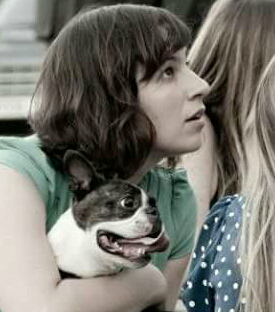 While her comics output has been quieter over the last couple of years, while she collaborated with UK comedy legend Adrian Edmondson on his children’s books, she’s back with a bang this year having been nominated for both the Arts Foundation Futures Awards and the Comedy Women in Print Prize.
While her comics output has been quieter over the last couple of years, while she collaborated with UK comedy legend Adrian Edmondson on his children’s books, she’s back with a bang this year having been nominated for both the Arts Foundation Futures Awards and the Comedy Women in Print Prize.
Today sees the publication of her first long-form work, the graphic memoir Shame Pudding from Street Noise Books, recently reviewed here at BF. I caught up with Danny to talk about her comics journey so far, the challenges of autobio work, and her rich memories of her colourful grandmothers…
ANDY OLIVER: To begin with can you tell us about the premise and genesis of Shame Pudding and the story you’re bringing to the comics page within its covers?
DANNY NOBLE: I’ve been describing Shame Pudding as the story of my brain going to war with itself while everyone around was being perfectly lovely.
Originally called Poisons and Painkillers, it was going to be a history of my altered states through various illnesses, injuries and losses, and the different ways I medicated. Liz from Street Noise Books was determined to work with me but not quite sure what to do with all my muddle.
I opened one e-mail on the Northern Line on the way to my day job. She said the thing she was most drawn to in the roughs was a memory of running to my grandma’s flat after she’d had a fall. My relationship with my grandma was what jumped out at her. That lit a fire in my head and I replied immediately that I had two amazing grandmas and they both lived around the corner when we were growing up, and one did this and the other did that, and so many anecdotes spilled out in that e-mail that I missed my stop on the tube and was late to work.
AO: Street Noise Books are a new publishing venture in the comics world. How did you get involved with them?
NOBLE: When I made my website I wrote on the main page I was “currently working on my graphic novel” in the desperate hope that someone would ask about it and that would force me to actually do it. One night I made the insomniac’s mistake of checking my e-mail at bedtime and found an e-mail from a Liz Frances asking exactly that. She’d seen a three-page comic I did for The Strumpet and was interested in working together. I looked at her Street Noise Books website and was jumping up and down for joy, no chance of sleeping that night. As well as having a massive love for the storytelling potential of comics she is very passionate about seeking out and amplifying voices that aren’t usually given a platform. I’ve seen brilliant work in progress from the other authors and artists she is working with and I think the Street Noise catalogue is going to be a very beautiful thing indeed.
AO: Much of your comics work has had an autobiographical emphasis, either directly (Monday Morning), through on-page stand-in characters (Hangover Farm), or more obliquely (Was It… Too Much for You?). What were the challenges and differences in working in a longer-form narrative, and in a more directly representational depiction of your life in Shame Pudding?
NOBLE: My comic work has always been episodic, that’s the way I work most naturally. I’d loved writing a few novella-type length things, so I thought I could carry a story over a longer distance, but because comic work takes so much more time and energy than writing (for me anyway) I needed someone else to impose a deadline to give me a reason to step away from the short strips and commit to a book.
Being so used to posting stuff on line and getting immediate feedback, it was unsettling hiding away and secretly making all these panels with no idea how they’d go down. But the main difference was the feeling that I was drawing stories of real people, without the comfort blanket of an avatar, however thinly disguised it might be. It’s one thing telling my own misadventures, but dragging my family into it too…that was always in the back of my mind.
AO: Shame Pudding is written for a wider readership than some of your other work which often has.. shall we say… a delightfully outrageous tone to it. Who would you describe as the target audience for the book?
NOBLE: Shame Pudding has been categorised as Young Adult because that’s the work that Street Noise puts out, and because it does spend a lot of time looking through my childhood eyes, but I hope it’s for anyone. Liz and the editor Ada Price nudged me to be a bit more linear than I’m used to, though I definitely still jump around a bit, but they also allowed me to explain myself as little as possible. I was very adamant about that as I hate being over-explained to as a reader.
It wasn’t written intentionally for a wider audience. Smaller if anything, as I was making it for my mum, dad and brother. When I began drawing Ollie and Alan it was to make me laugh, and because other people responded well to them. I didn’t see them as being an acquired taste though I’m sure they are! When my work is finished being made I’d always like as many people as possible to see any of it. If Shame Pudding is less outrageous it’s only because my grandmas didn’t get their cocks out as often as Ollie and Alan do.
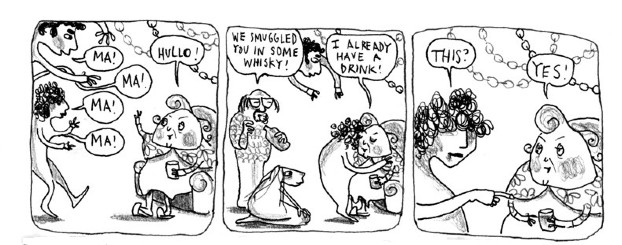
AO: What are the particular responsibilities of working in the autobiographical strand of storytelling in terms of the real lives and people you’re depicting?
NOBLE: I tried as much as possible to be fair and to show myself as the villain or the ridiculous one, but I’m still full of anxieties at upsetting or misrepresenting anyone. I even feel nervous that anyone might feel left out if they ended up on the editing floor! I’d love to be like David Sedaris and write fearlessly and unselfconsciously about those around me, but as you’ll see in Shame Pudding I am pretty much constantly consumed with worries of hurting or angering anyone! However, the drive to make comics won out in this battle, so I’ll just have to hope it all is read with understanding and humour.
AO: I spoke of the appeal of your “scratchy, inky layouts and charmingly distorted caricature” when I reviewed the book recently at Broken Frontier. Can you give us some insights into your artistic process and the way you work?
NOBLE: This is another thing plaguing my brain…all my friends and family are incredibly good-looking and I drew ’em how I drew ’em cause that’s the way my pen works! As for layout I originally thought it was going to be a lot wilder on the page. Explosive double-page spreads and small spot illustrations. But as I got further into planning it out it felt like panels were my friends and having them as a foundation made it more effective when I wanted to break out and run amok.
I would make thumbnails that were basically squares with dialogue written in them, then I’d redo these as readable roughs, so poor Liz and Ada could navigate their way through them. After hearing back from them I’d draw them out in best. And then after that it was just a matter of correcting my many, many spelling mistakes…
AO: Your comics output has been a little quieter in recent years as you took a sidestep into children’s illustration. Can you tell us about that experience and your collaborations with comedian and actor Adrian Edmondson on his children’s novels?
NOBLE: Working on Ade’s books with Puffin was my first real experience of professional collaboration. I’d done a bit of storyboarding work before, but this was the first time I had to slow down and reflect on my drawing. Before I’d always obstinately refuse to redraw things thinking it would lose it’s energy and rawness, but actually that’s not the case and that was an excellent lesson to learn.
This is going to sound a bit mad or ungrateful but I’ve been reluctant to chase up illustration jobs because for me the drawing and plotting and choice of words were so entwined, that the work of illustrating other people’s ideas feels almost painfully unnatural to me. But Adrian Edmondson was one of my biggest childhood comedy heroes so it was brilliant to go poking around inside his clever brain.
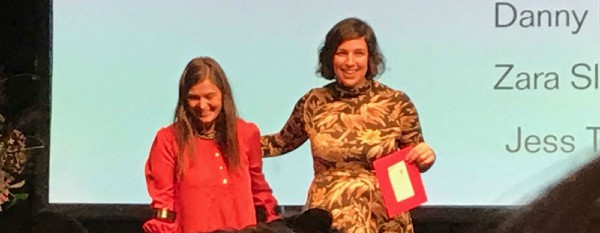
AO: It’s was already a huge year for you even before the publication of Shame Pudding. How has it felt to be nominated this year for both the Arts Futures Foundation Awards (above) and the Comedy Women in Print Prize?
NOBLE: It felt blooming brilliant. My brain did it’s best to throw up reasons why I shouldn’t be nominated, or terrible disastrous things that might occur now I had been. But I’m learning to politely tell it to shut the fuck up.
The Arts Foundation has been lovely and supportive of work I’ve done since, letting me take over their Instagram account and posting about Shame Pudding, and the CWIP Prize seems so excited at the idea of embracing our comics community that I could just hug them all.
AO: What do you think Ma and Grandma Min would have made of their star turn on the comics page?
NOBLE: My dad said that Grandma Min would hate the way I drew her hair, but that she would, as always, have been my biggest cheerleader. And Ma would threaten to punch me on the nose for drawing her as a bit of a drinker at the same time as cracking open a bottle of Bells to celebrate the publication.
AO: And finally, post-Shame Pudding, what are your next plans in comics?
NOBLE: I’d drawn a few new Ollie and Alans to cheer myself up in lockdown, I might turn that into a book. Longer-term, at the end of last year I had finally begun working on a comic version of my book Mary Deadly I wrote in 2010, but I’m not sure if anyone will be in the mood to read about a woman who goes around intentionally spreading disease right about now! Either incredibly good, or horrifically bad timing. Not sure which yet.
For more on the work of Danny Noble visit her website here. You can follow her on Twitter here and Instagram here. Follow Street Noise Books on Twitter Twitter here and Instagram here.
Interview by Andy Oliver





